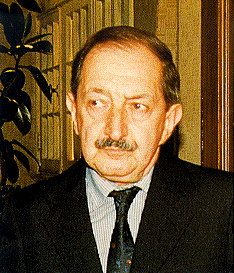Eduardo Anguita facts for kids
Eduardo Anguita Cuéllar (born in Yerbas Buenas, Linares in November 1914 – died in Santiago de Chile on August 12, 1992) was a famous Chilean poet. He won the important Chilean National Prize for Literature in 1988, which is a big honor for writers in Chile.
Life
Eduardo Anguita grew up in San Bernardo. Later, he went to the College of the Augustine Fathers in Santiago. When he was 16, he started studying law at the Catholic University of Chile. However, he stopped after three years because he wanted to focus on writing poetry.
After that, he worked with many newspapers and magazines. Some of these were Ercilla, Plan, Atenea, La Nación, and El Mercurio. He also worked for advertising companies and on different radio shows.
His first poems were published in 1934 in a book called Tránsito al fin. This book was later translated into English in 1942. Eduardo Anguita was part of a group of writers known as the Generation of 38. He began his writing career when styles like Surrealism and Creationism were popular. Creationism was a movement led by Vicente Huidobro, who became a close friend of Anguita.
In 1935, Anguita worked with Volodia Teitelboim to publish a book called Antología de Poesía Chilena Nueva. This book included poems from many well-known poets like Vicente Huidobro, Pablo Neruda, and Pablo de Rokha. It also featured poems by Anguita and Teitelboim themselves. A few years later, one of Anguita's short stories was included in another collection of stories.
In 1944, a US publisher, New Directions Publishers, chose him and his friend Pablo Neruda to be part of their yearly book of Latin-American poetry.
During the government of Carlos Ibáñez del Campo in 1955, Eduardo Anguita was named a cultural attache in Mexico. This meant he helped with cultural connections between Chile and Mexico. While in Mexico, he published a book called Palabras al oído de México in 1960.
Towards the end of his life, he worked as a publisher at Editorial Universitaria, helping other writers get their books printed.
Works
What he wrote about
People often call Anguita a "metaphysical poet." This means he thought deeply about big ideas in his poems. He explored topics like beauty, death, how short human life is, and memories.
Religion was also important in his work, as he was openly connected to Catholicism. However, his religious views were also shaped by different ideas, making his poetry unique.
His ideas about poetry
Anguita believed that poetry was not just about copying real life. For him, it was more about ideas and deep thoughts.
In a book he created with Teitelboim, they explained that poetry is a way for the soul to speak. It helps the soul feel important in the universe. They thought poetry should not just be for fun or entertainment.
Anguita once said that for him, poetry starts with seeing something new. This first vision should always be how the poem is expressed.
He also saw a big difference between everyday language and the language of poetry. He thought that regular talk happens when we are fully awake and thinking clearly. But poetry comes from a mix of our conscious thoughts and our subconscious mind.
List of his books
- 1934: Tránsito al fin (poetry).
- 1935: Antología de la Poesía Chilena Nueva (a collection of poems with Volodia Teitelboim).
- 1948: Últimos poemas (poetry).
- 1945: Antología de Vicente Huidobro (a collection of poems by Vicente Huidobro).
- 1950: Inseguridad del hombre (short stories).
- 1951: Anguita, cinco poemas (poetry).
- 1960: Palabras al oído de México (prose and poetry).
- 1962: El poliedro y el mar (poetry).
- 1963: Rimbaud pecador (an essay).
- 1967: Venus en el pudridero (poetry).
- 1970: Poesía Entera (a collection of his complete poems).
- 1980: Venus en el pudridero was published again with corrections.
- 1988: La belleza del pensar (chronicles).
Awards
- 1963: He won the Santiago Municipality Award for poetry for his book El poliedro y el mar.
- 1972: He won the Santiago Municipality Award for poetry again for Poesía entera.
- 1981: He received the María Luisa Bombal Award from the Viña del Mar Municipality.
- 1988: He was given the National Prize for Literature, one of Chile's highest honors for writers.
See also
 In Spanish: Eduardo Anguita para niños
In Spanish: Eduardo Anguita para niños


